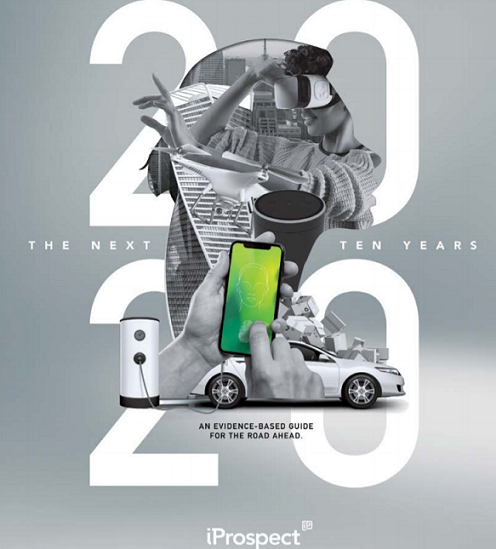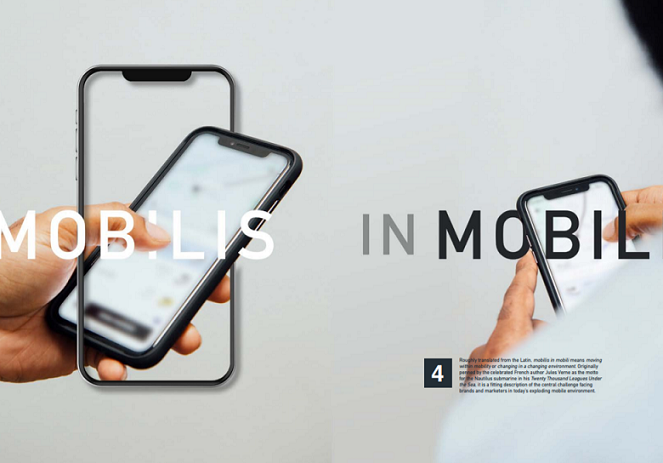 The leading global business performance agency, iProspect from the house of Dentsu Aegis Network (DAN), has released their fifth annual whitepaper, ‘Future Focus 2020: The Next Ten Years’. It is built to help marketer navigate the road ahead in a hyper-sensitive global media landscape. The report uses evidence-based data and interviews to predict that those businesses that reconcile long-term planning with short-term performance will see continued success in the decade ahead.
The leading global business performance agency, iProspect from the house of Dentsu Aegis Network (DAN), has released their fifth annual whitepaper, ‘Future Focus 2020: The Next Ten Years’. It is built to help marketer navigate the road ahead in a hyper-sensitive global media landscape. The report uses evidence-based data and interviews to predict that those businesses that reconcile long-term planning with short-term performance will see continued success in the decade ahead.
iProspect interviewed more than 350 global marketers and leaders across a broad spectrum of brands that included FTSE 100 and Fortune 500 companies, to not only understand their expectations for 2020 but also their hopes and concerns for the next ten years. The report also includes exclusive interviews with global leaders from businesses such as Sprint, SideWalk Labs, Microsoft, and Buttercloth.
Feedback shows that increasing trust and harnessing technology are the key ambitions for 2020 and that the search for ways to keep pace with the speed of change in the next five years keeps marketers awake at night. Marketers are torn between what the industry dictates and their own experience of digital transformation. 78% identify having a connected data strategy as the most important component of a successful digital transformation, while 69% believe a clear culture transformation strategy is the most underestimated facet. It is clear that inclusivity is still more a concept than a reality. While 93% of marketers believe inclusive marketing is important, fewer than one in ten review for inclusivity as part of product and marketing campaign development. New commerce models are predicted to turn heads; one out of four marketers believe subscriptions could represent more than 50% of their revenues in five years, and less than half declare they don’t plan to get involved in recommerce at all in the next five years.
In 2020, more than 1 billion people are expected to make a proximity mobile payment.
By 2023, there should be about as many digital voice assistants in use as there are people living across the world.2 3 By 2025, the total GDP is expected to grow by a third. By 2028, mobile display advertising alone is forecast to represent a $178 billion (USD) market.
By 2030, more than 1 billion people are likely to join the middle class, whose demand powers most economies.
While the 2010s have undeniably been a period of deep changes for the world, they were just a glimpse of the economical, technological and demographical transformations that the 2020s will bring. To make the most of the opportunities offered by this booming landscape, brands will have to navigate increasing consumer expectations, the ever-expanding power of technological platforms, massive amounts of available data, and moving regional regulatory frameworks. A colossal undertaking.

For the past five years, iProspect has been asking clients about their ambitions for the year to come to help them better prepare for the challenges ahead. This year, we surveyed 250 top marketers across 35 countries to not only understand their expectations for 2020, but also their hopes and concerns for the next ten years. • Increasing trust and harnessing technology are the key ambitions for 2020: increasing consumer trust in their brands is the utmost priority for marketers (8.8 grade out of 10), followed by using data to create personalised consumer experiences (8.7) and maximising sales within online marketplaces (7.5). Their key challenges remain efficiently managing high volumes of data, understanding the impact of Artificial Intelligence (AI) on marketing strategies, and improving internal structure. In this context, it is no surprise the most sought-after talent profiles to complement marketing teams in the next five years are data scientists and analysts (33% of respondents).

• The search for ways to keep pace with the speed of change keeps marketers awake at night: when it comes to the next five to ten years, marketers say the three most important macro-trends that will impact the marketing discipline are the growing importance of artificial intelligence and automation in consumers’ lives and in marketing practice (31% of respondents), the increasing connectivity of people and devices (30%), and the new demands from consumers around sustainable practices (15%).
• Marketers are torn between what the industry dictates and their own experience of digital transformation: marketers identify having a connected data strategy (cited by 78% of respondents) and building the right technology infrastructure (59%) as the most important components of a successful digital transformation. However, they believe defining a clear culture transformation strategy (69%) and establishing a strong learning and development strategy (58%) are the most underestimated facets.
• Inclusivity is still more a concept than a reality: Ninetythree percent of marketers believe inclusive marketing is important as a moral imperative and/or for the business potential it represents. However, in practice, less than one in ten review for inclusivity as part of product and marketing campaign development. When thinking about the diverse groups that were represented at least once in a positive way in the campaigns run over the last six months, plus-sized individuals, disabled people and non-binary gender people are still severely underrepresented.
• New commerce models turn heads: only one out of five marketers believes the subscription model cannot be applied to their industry, while one out of four believes subscriptions could represent more than 20% of their revenues in five years. Additionally, although two out of three marketers believe recommerce is not applicable to their industry as of today, less than half declare they don’t plan to get involved in recommerce or don’t anticipate their recommerce revenue streams to increase at all in the next five years. Marketers are also fully aware of the sustainability groundswell: only three percent believe a company’s sustainability practices will be of no or minimal importance five years from now. For this fifth annual edition of Future Focus, iProspect builds upon the expectations and concerns shared by marketers to examine four major themes that we believe will shape the consumption landscape and the marketing discipline over the next years.
• Digital transformation… still loading examines the current state of digital transformation and what makes brands successful in the digital economy.
• De-averaging looks into the rise of Diversity & Inclusivity and the personalisation imperative.
• Commerce, redux ponders the growing commerce models, from direct-to-consumer to recommerce and subscriptions.
• Mobilis in Mobili delves into the increasing connectivity and its implications for client centricity and the marketing practice. By not only exploring what these trends are and what they mean, but also looking at how to make the most of these business opportunities by preparing today, Future Focus 2020: The Next Ten Years invites marketers to reconcile long-term planning with short-term performance.
In this latest publication, iProspect not only explores what these trends are and what they mean but also, look at how to make the most of these business opportunities by preparing today.’Future Focus 2020: The Next Ten Years’ invites marketers to reconcile long-term planning with short-term performance.


